Social Capital in Singapore: Family Roles and Tuition's Influence
VerifiedAdded on 2023/06/04
|8
|1733
|401
Essay
AI Summary
This essay examines the crucial role of the family in the production of social capital, particularly within the context of Singapore. It explores how parents navigate their parenting roles to enhance their children's academic performance, specifically focusing on the impact of significant spending on private tuition. The analysis delves into how this expenditure is linked to the formation of social capital within the family, considering social structural factors that influence the development of social capital and opportunity structures. The essay applies relevant sociological theories, such as structural functional theory, to support its arguments, critically evaluating private tuition as a potential social determinant in the creation of family-based social capital. The findings highlight the importance of family in shaping social networks and influencing educational outcomes, influenced by class divisions and the pursuit of educational excellence through private tuition. The essay concludes that the family's role in Singapore is central to the production of social capital and the desire to provide the best educational opportunities for their children. This essay provides a comprehensive understanding of the topic, which is available on Desklib.
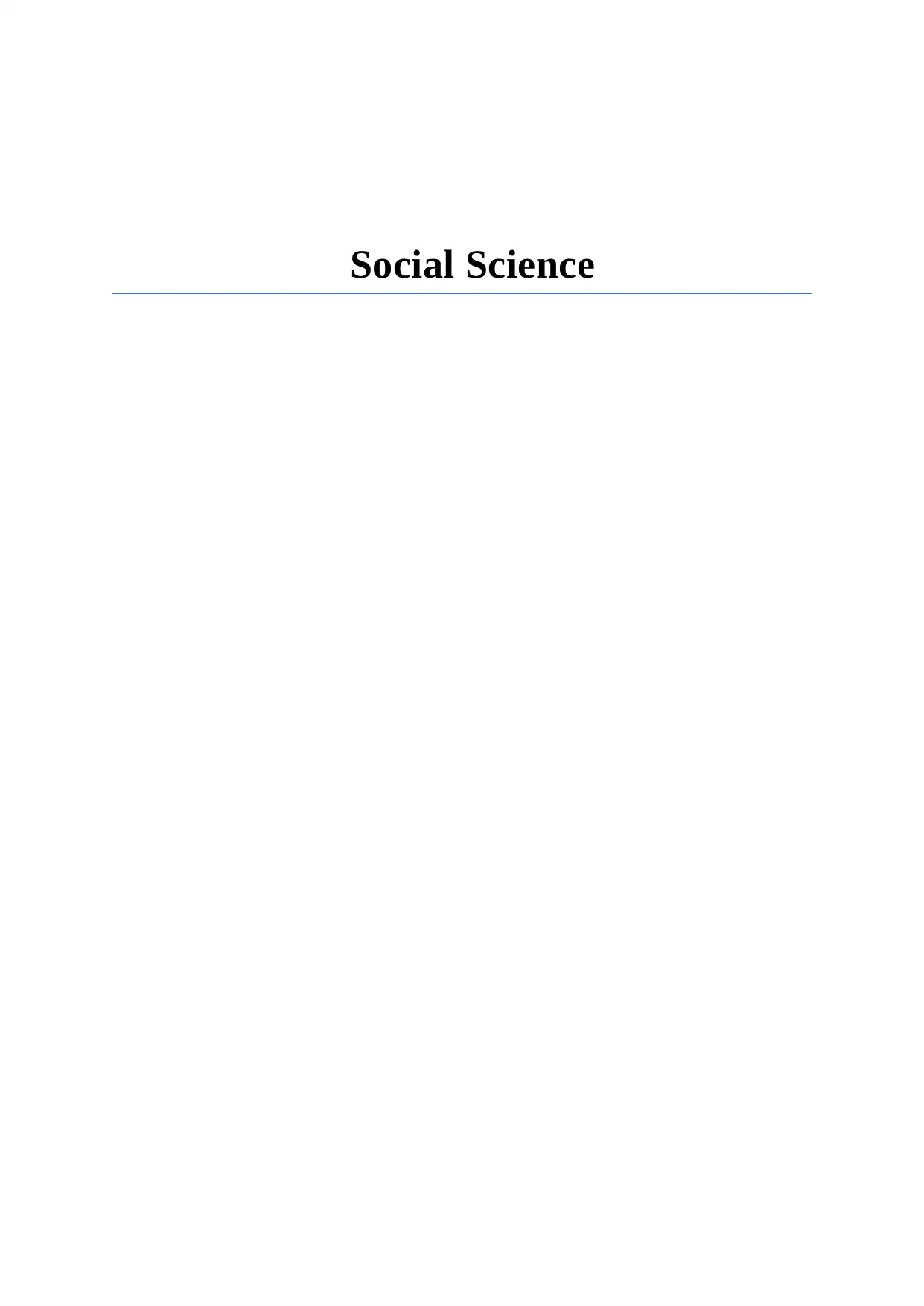
Social Science
Paraphrase This Document
Need a fresh take? Get an instant paraphrase of this document with our AI Paraphraser
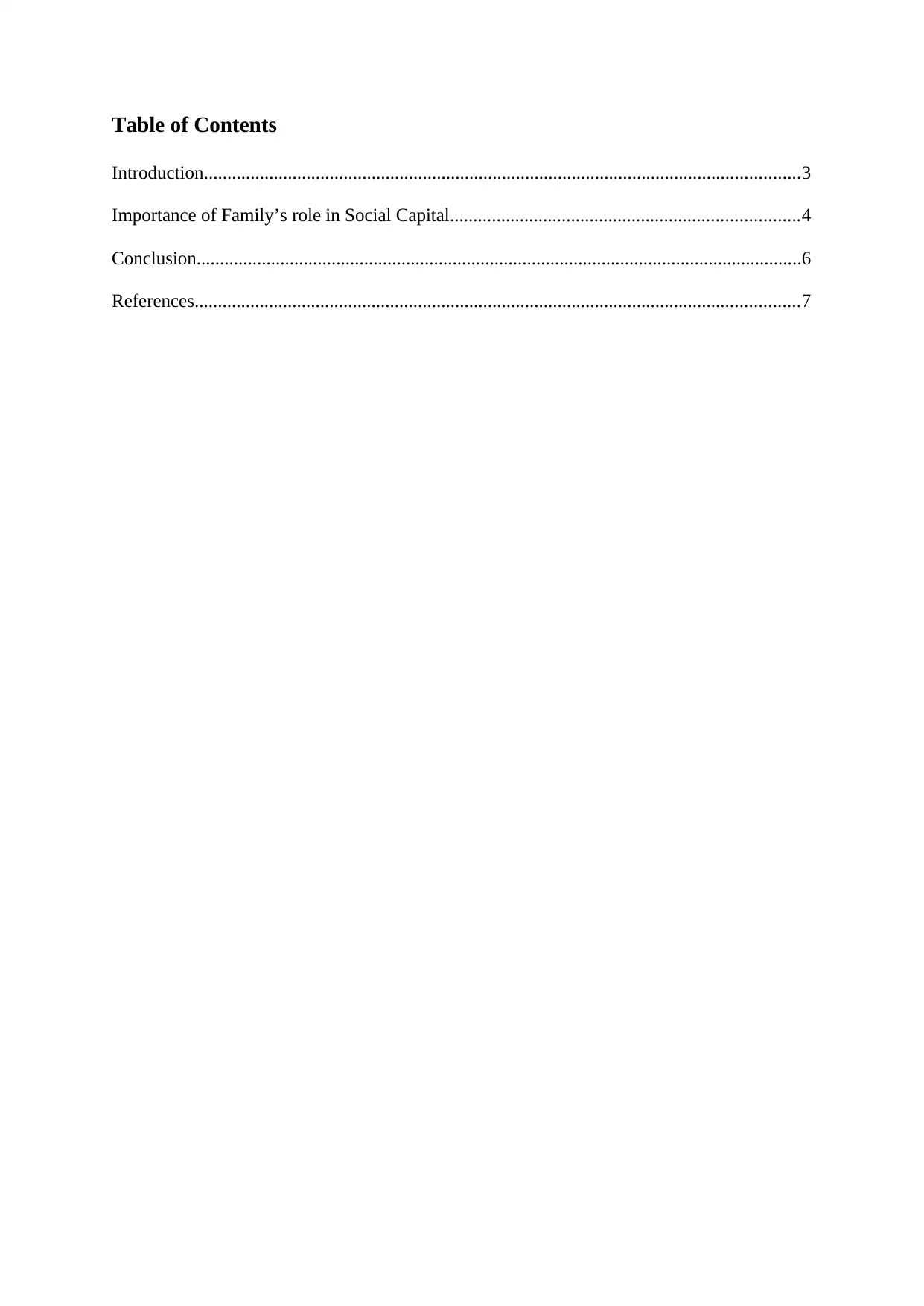
Table of Contents
Introduction................................................................................................................................3
Importance of Family’s role in Social Capital...........................................................................4
Conclusion..................................................................................................................................6
References..................................................................................................................................7
Introduction................................................................................................................................3
Importance of Family’s role in Social Capital...........................................................................4
Conclusion..................................................................................................................................6
References..................................................................................................................................7
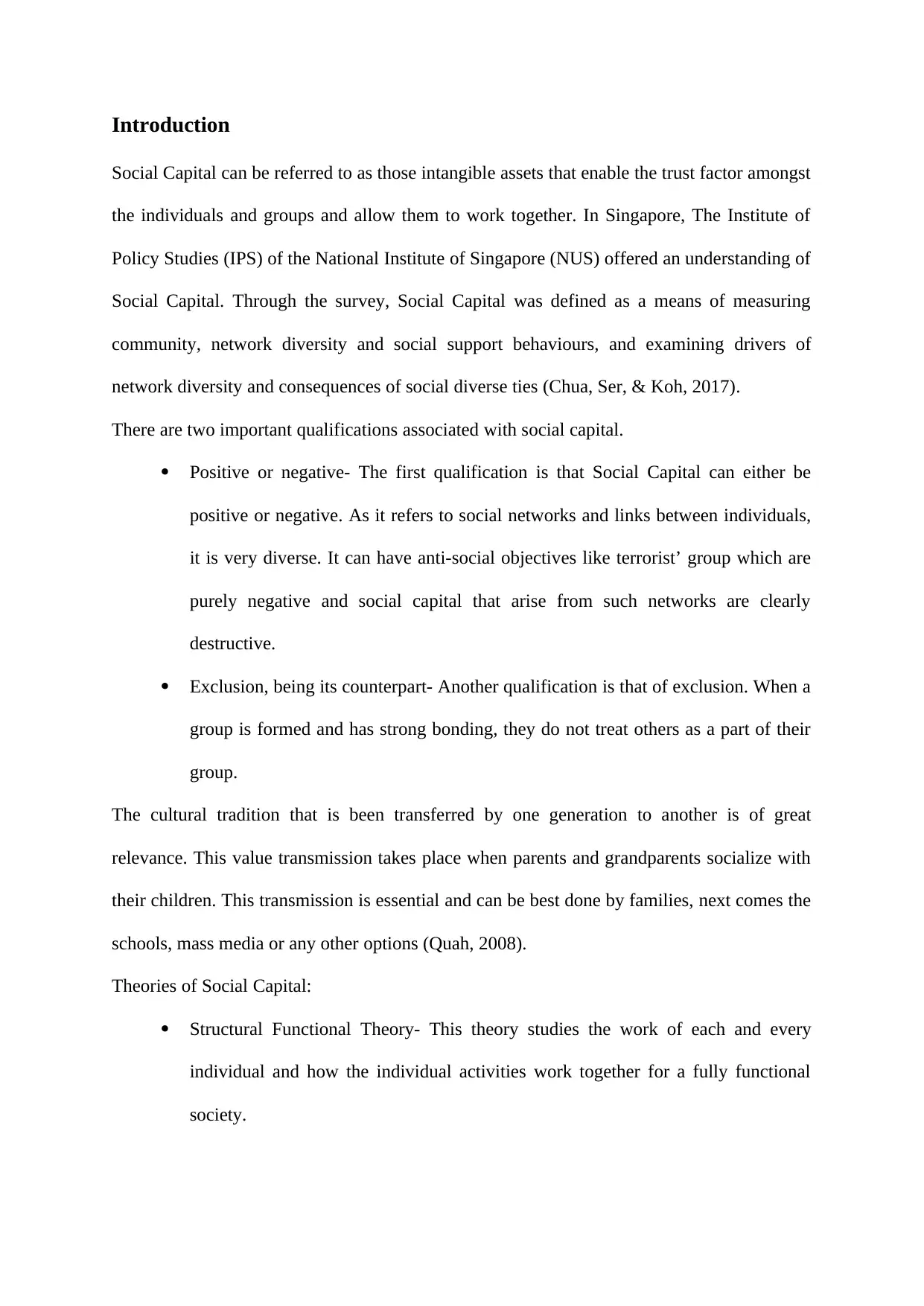
Introduction
Social Capital can be referred to as those intangible assets that enable the trust factor amongst
the individuals and groups and allow them to work together. In Singapore, The Institute of
Policy Studies (IPS) of the National Institute of Singapore (NUS) offered an understanding of
Social Capital. Through the survey, Social Capital was defined as a means of measuring
community, network diversity and social support behaviours, and examining drivers of
network diversity and consequences of social diverse ties (Chua, Ser, & Koh, 2017).
There are two important qualifications associated with social capital.
Positive or negative- The first qualification is that Social Capital can either be
positive or negative. As it refers to social networks and links between individuals,
it is very diverse. It can have anti-social objectives like terrorist’ group which are
purely negative and social capital that arise from such networks are clearly
destructive.
Exclusion, being its counterpart- Another qualification is that of exclusion. When a
group is formed and has strong bonding, they do not treat others as a part of their
group.
The cultural tradition that is been transferred by one generation to another is of great
relevance. This value transmission takes place when parents and grandparents socialize with
their children. This transmission is essential and can be best done by families, next comes the
schools, mass media or any other options (Quah, 2008).
Theories of Social Capital:
Structural Functional Theory- This theory studies the work of each and every
individual and how the individual activities work together for a fully functional
society.
Social Capital can be referred to as those intangible assets that enable the trust factor amongst
the individuals and groups and allow them to work together. In Singapore, The Institute of
Policy Studies (IPS) of the National Institute of Singapore (NUS) offered an understanding of
Social Capital. Through the survey, Social Capital was defined as a means of measuring
community, network diversity and social support behaviours, and examining drivers of
network diversity and consequences of social diverse ties (Chua, Ser, & Koh, 2017).
There are two important qualifications associated with social capital.
Positive or negative- The first qualification is that Social Capital can either be
positive or negative. As it refers to social networks and links between individuals,
it is very diverse. It can have anti-social objectives like terrorist’ group which are
purely negative and social capital that arise from such networks are clearly
destructive.
Exclusion, being its counterpart- Another qualification is that of exclusion. When a
group is formed and has strong bonding, they do not treat others as a part of their
group.
The cultural tradition that is been transferred by one generation to another is of great
relevance. This value transmission takes place when parents and grandparents socialize with
their children. This transmission is essential and can be best done by families, next comes the
schools, mass media or any other options (Quah, 2008).
Theories of Social Capital:
Structural Functional Theory- This theory studies the work of each and every
individual and how the individual activities work together for a fully functional
society.
⊘ This is a preview!⊘
Do you want full access?
Subscribe today to unlock all pages.

Trusted by 1+ million students worldwide
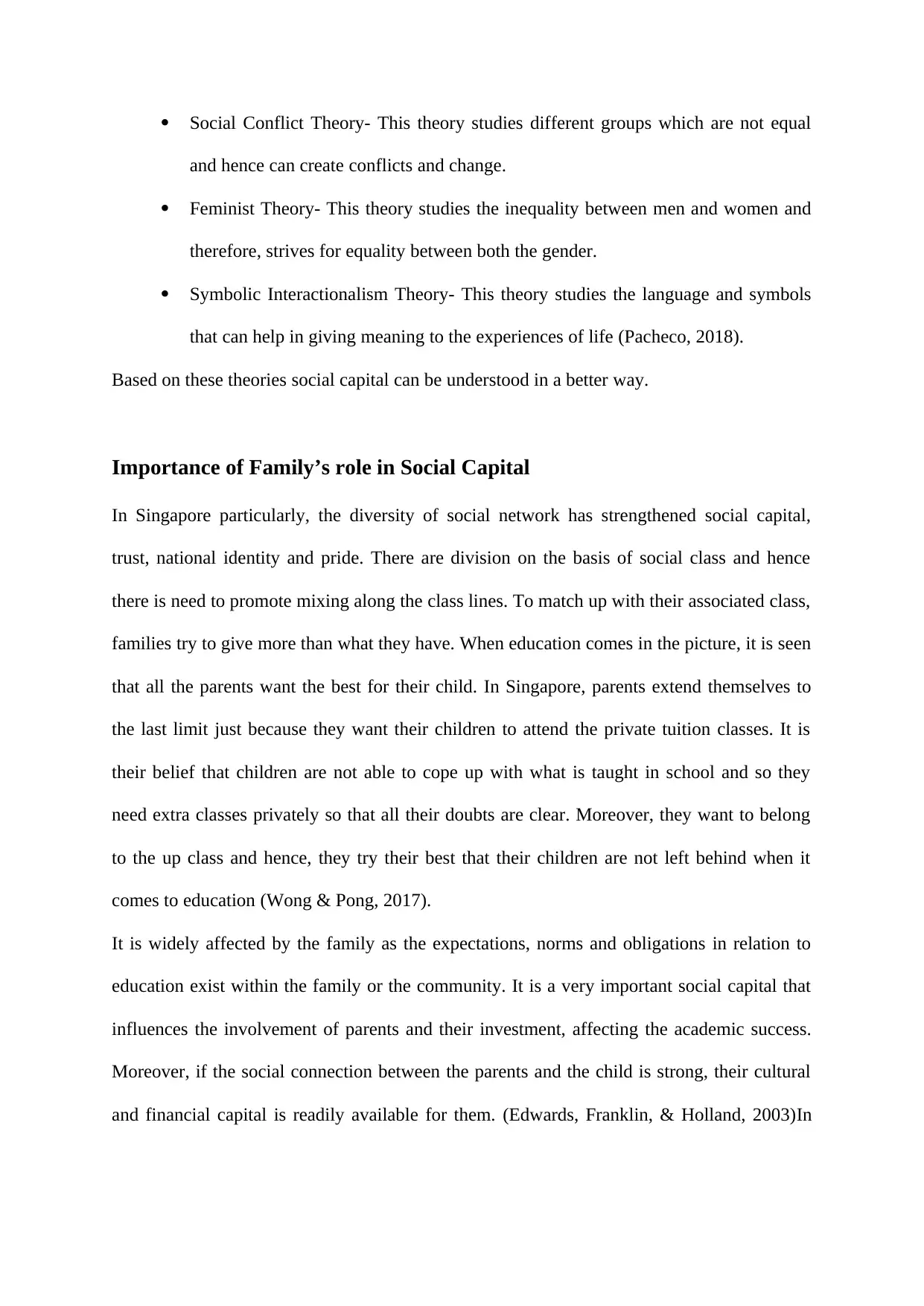
Social Conflict Theory- This theory studies different groups which are not equal
and hence can create conflicts and change.
Feminist Theory- This theory studies the inequality between men and women and
therefore, strives for equality between both the gender.
Symbolic Interactionalism Theory- This theory studies the language and symbols
that can help in giving meaning to the experiences of life (Pacheco, 2018).
Based on these theories social capital can be understood in a better way.
Importance of Family’s role in Social Capital
In Singapore particularly, the diversity of social network has strengthened social capital,
trust, national identity and pride. There are division on the basis of social class and hence
there is need to promote mixing along the class lines. To match up with their associated class,
families try to give more than what they have. When education comes in the picture, it is seen
that all the parents want the best for their child. In Singapore, parents extend themselves to
the last limit just because they want their children to attend the private tuition classes. It is
their belief that children are not able to cope up with what is taught in school and so they
need extra classes privately so that all their doubts are clear. Moreover, they want to belong
to the up class and hence, they try their best that their children are not left behind when it
comes to education (Wong & Pong, 2017).
It is widely affected by the family as the expectations, norms and obligations in relation to
education exist within the family or the community. It is a very important social capital that
influences the involvement of parents and their investment, affecting the academic success.
Moreover, if the social connection between the parents and the child is strong, their cultural
and financial capital is readily available for them. (Edwards, Franklin, & Holland, 2003)In
and hence can create conflicts and change.
Feminist Theory- This theory studies the inequality between men and women and
therefore, strives for equality between both the gender.
Symbolic Interactionalism Theory- This theory studies the language and symbols
that can help in giving meaning to the experiences of life (Pacheco, 2018).
Based on these theories social capital can be understood in a better way.
Importance of Family’s role in Social Capital
In Singapore particularly, the diversity of social network has strengthened social capital,
trust, national identity and pride. There are division on the basis of social class and hence
there is need to promote mixing along the class lines. To match up with their associated class,
families try to give more than what they have. When education comes in the picture, it is seen
that all the parents want the best for their child. In Singapore, parents extend themselves to
the last limit just because they want their children to attend the private tuition classes. It is
their belief that children are not able to cope up with what is taught in school and so they
need extra classes privately so that all their doubts are clear. Moreover, they want to belong
to the up class and hence, they try their best that their children are not left behind when it
comes to education (Wong & Pong, 2017).
It is widely affected by the family as the expectations, norms and obligations in relation to
education exist within the family or the community. It is a very important social capital that
influences the involvement of parents and their investment, affecting the academic success.
Moreover, if the social connection between the parents and the child is strong, their cultural
and financial capital is readily available for them. (Edwards, Franklin, & Holland, 2003)In
Paraphrase This Document
Need a fresh take? Get an instant paraphrase of this document with our AI Paraphraser
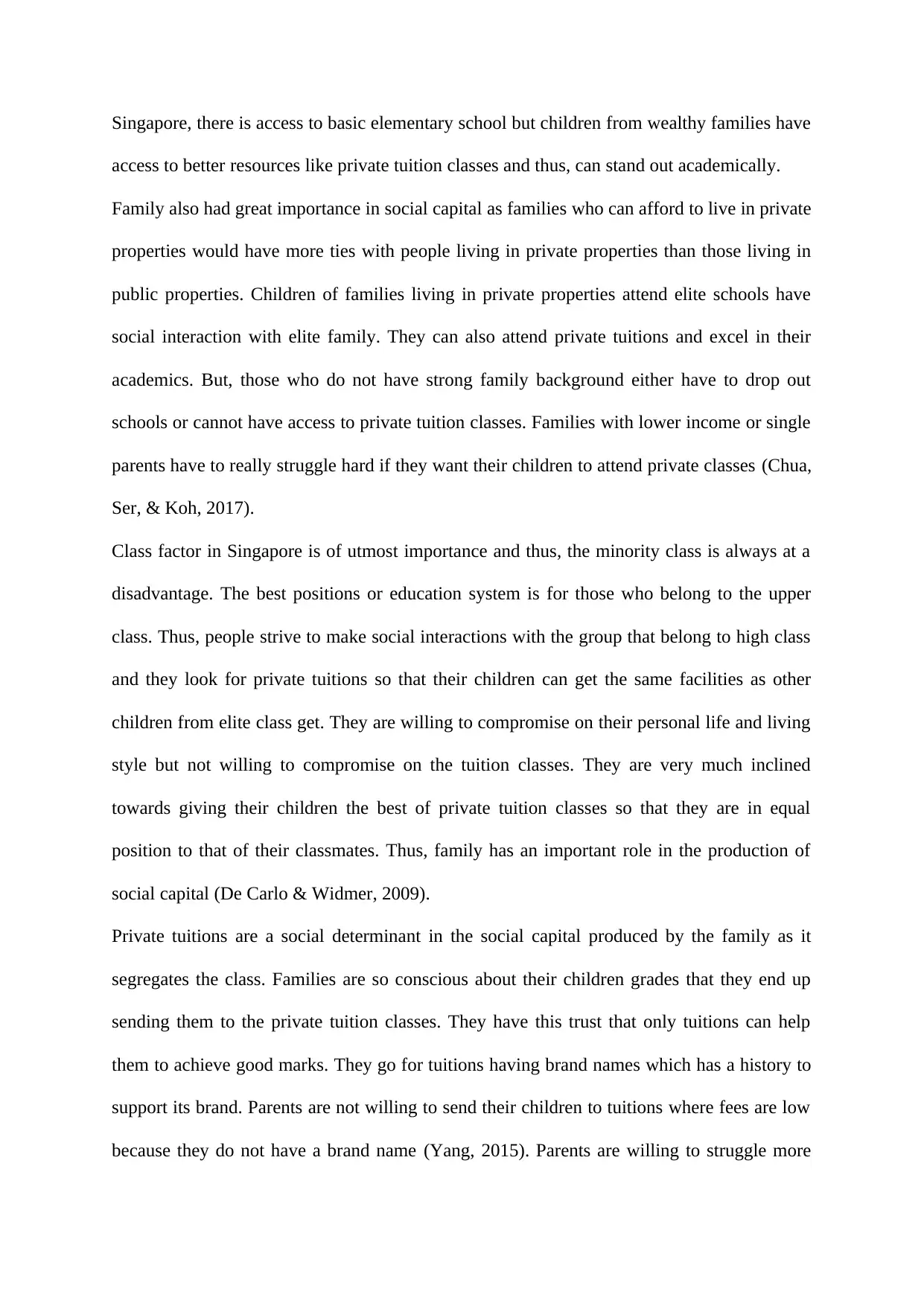
Singapore, there is access to basic elementary school but children from wealthy families have
access to better resources like private tuition classes and thus, can stand out academically.
Family also had great importance in social capital as families who can afford to live in private
properties would have more ties with people living in private properties than those living in
public properties. Children of families living in private properties attend elite schools have
social interaction with elite family. They can also attend private tuitions and excel in their
academics. But, those who do not have strong family background either have to drop out
schools or cannot have access to private tuition classes. Families with lower income or single
parents have to really struggle hard if they want their children to attend private classes (Chua,
Ser, & Koh, 2017).
Class factor in Singapore is of utmost importance and thus, the minority class is always at a
disadvantage. The best positions or education system is for those who belong to the upper
class. Thus, people strive to make social interactions with the group that belong to high class
and they look for private tuitions so that their children can get the same facilities as other
children from elite class get. They are willing to compromise on their personal life and living
style but not willing to compromise on the tuition classes. They are very much inclined
towards giving their children the best of private tuition classes so that they are in equal
position to that of their classmates. Thus, family has an important role in the production of
social capital (De Carlo & Widmer, 2009).
Private tuitions are a social determinant in the social capital produced by the family as it
segregates the class. Families are so conscious about their children grades that they end up
sending them to the private tuition classes. They have this trust that only tuitions can help
them to achieve good marks. They go for tuitions having brand names which has a history to
support its brand. Parents are not willing to send their children to tuitions where fees are low
because they do not have a brand name (Yang, 2015). Parents are willing to struggle more
access to better resources like private tuition classes and thus, can stand out academically.
Family also had great importance in social capital as families who can afford to live in private
properties would have more ties with people living in private properties than those living in
public properties. Children of families living in private properties attend elite schools have
social interaction with elite family. They can also attend private tuitions and excel in their
academics. But, those who do not have strong family background either have to drop out
schools or cannot have access to private tuition classes. Families with lower income or single
parents have to really struggle hard if they want their children to attend private classes (Chua,
Ser, & Koh, 2017).
Class factor in Singapore is of utmost importance and thus, the minority class is always at a
disadvantage. The best positions or education system is for those who belong to the upper
class. Thus, people strive to make social interactions with the group that belong to high class
and they look for private tuitions so that their children can get the same facilities as other
children from elite class get. They are willing to compromise on their personal life and living
style but not willing to compromise on the tuition classes. They are very much inclined
towards giving their children the best of private tuition classes so that they are in equal
position to that of their classmates. Thus, family has an important role in the production of
social capital (De Carlo & Widmer, 2009).
Private tuitions are a social determinant in the social capital produced by the family as it
segregates the class. Families are so conscious about their children grades that they end up
sending them to the private tuition classes. They have this trust that only tuitions can help
them to achieve good marks. They go for tuitions having brand names which has a history to
support its brand. Parents are not willing to send their children to tuitions where fees are low
because they do not have a brand name (Yang, 2015). Parents are willing to struggle more
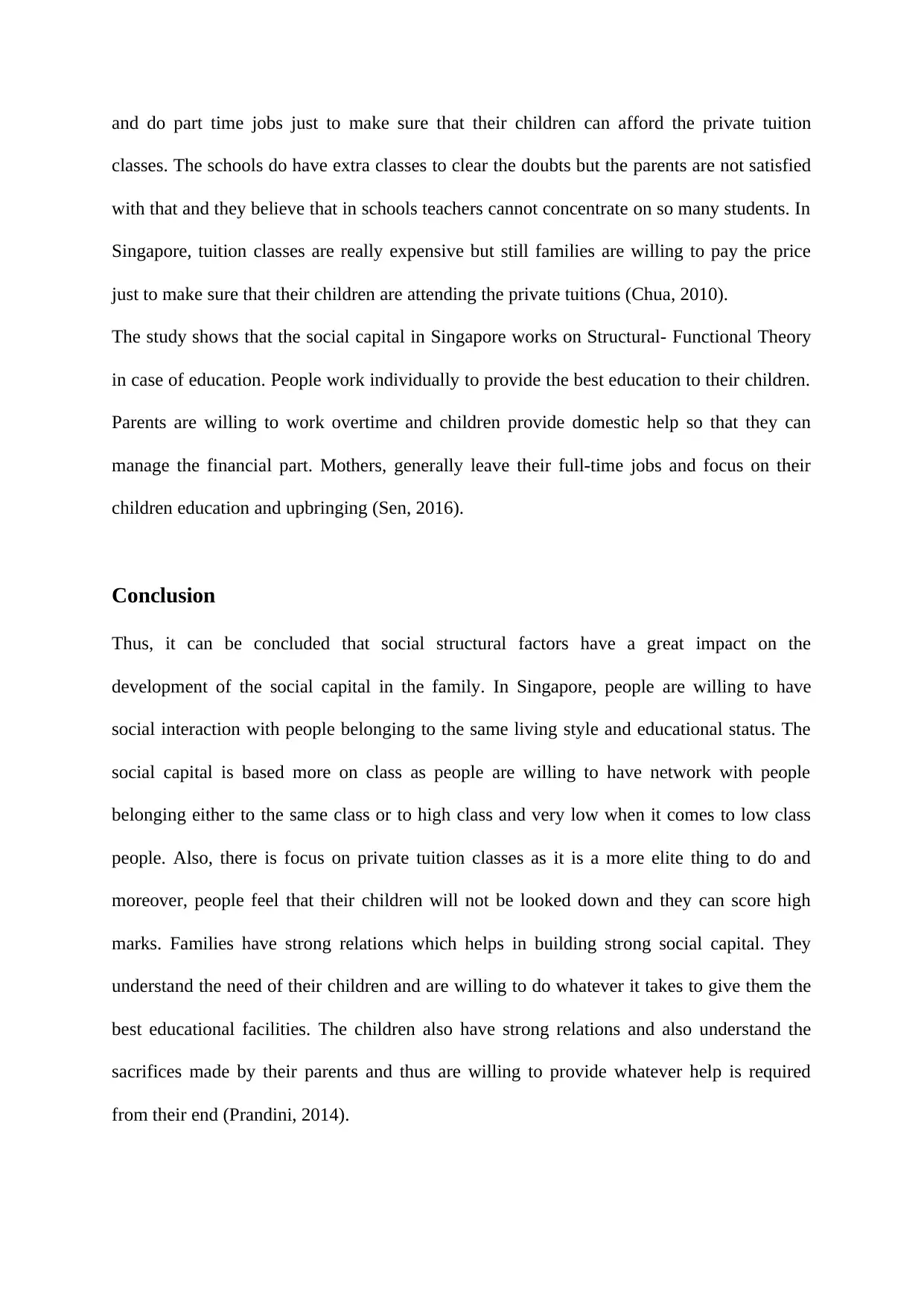
and do part time jobs just to make sure that their children can afford the private tuition
classes. The schools do have extra classes to clear the doubts but the parents are not satisfied
with that and they believe that in schools teachers cannot concentrate on so many students. In
Singapore, tuition classes are really expensive but still families are willing to pay the price
just to make sure that their children are attending the private tuitions (Chua, 2010).
The study shows that the social capital in Singapore works on Structural- Functional Theory
in case of education. People work individually to provide the best education to their children.
Parents are willing to work overtime and children provide domestic help so that they can
manage the financial part. Mothers, generally leave their full-time jobs and focus on their
children education and upbringing (Sen, 2016).
Conclusion
Thus, it can be concluded that social structural factors have a great impact on the
development of the social capital in the family. In Singapore, people are willing to have
social interaction with people belonging to the same living style and educational status. The
social capital is based more on class as people are willing to have network with people
belonging either to the same class or to high class and very low when it comes to low class
people. Also, there is focus on private tuition classes as it is a more elite thing to do and
moreover, people feel that their children will not be looked down and they can score high
marks. Families have strong relations which helps in building strong social capital. They
understand the need of their children and are willing to do whatever it takes to give them the
best educational facilities. The children also have strong relations and also understand the
sacrifices made by their parents and thus are willing to provide whatever help is required
from their end (Prandini, 2014).
classes. The schools do have extra classes to clear the doubts but the parents are not satisfied
with that and they believe that in schools teachers cannot concentrate on so many students. In
Singapore, tuition classes are really expensive but still families are willing to pay the price
just to make sure that their children are attending the private tuitions (Chua, 2010).
The study shows that the social capital in Singapore works on Structural- Functional Theory
in case of education. People work individually to provide the best education to their children.
Parents are willing to work overtime and children provide domestic help so that they can
manage the financial part. Mothers, generally leave their full-time jobs and focus on their
children education and upbringing (Sen, 2016).
Conclusion
Thus, it can be concluded that social structural factors have a great impact on the
development of the social capital in the family. In Singapore, people are willing to have
social interaction with people belonging to the same living style and educational status. The
social capital is based more on class as people are willing to have network with people
belonging either to the same class or to high class and very low when it comes to low class
people. Also, there is focus on private tuition classes as it is a more elite thing to do and
moreover, people feel that their children will not be looked down and they can score high
marks. Families have strong relations which helps in building strong social capital. They
understand the need of their children and are willing to do whatever it takes to give them the
best educational facilities. The children also have strong relations and also understand the
sacrifices made by their parents and thus are willing to provide whatever help is required
from their end (Prandini, 2014).
⊘ This is a preview!⊘
Do you want full access?
Subscribe today to unlock all pages.

Trusted by 1+ million students worldwide
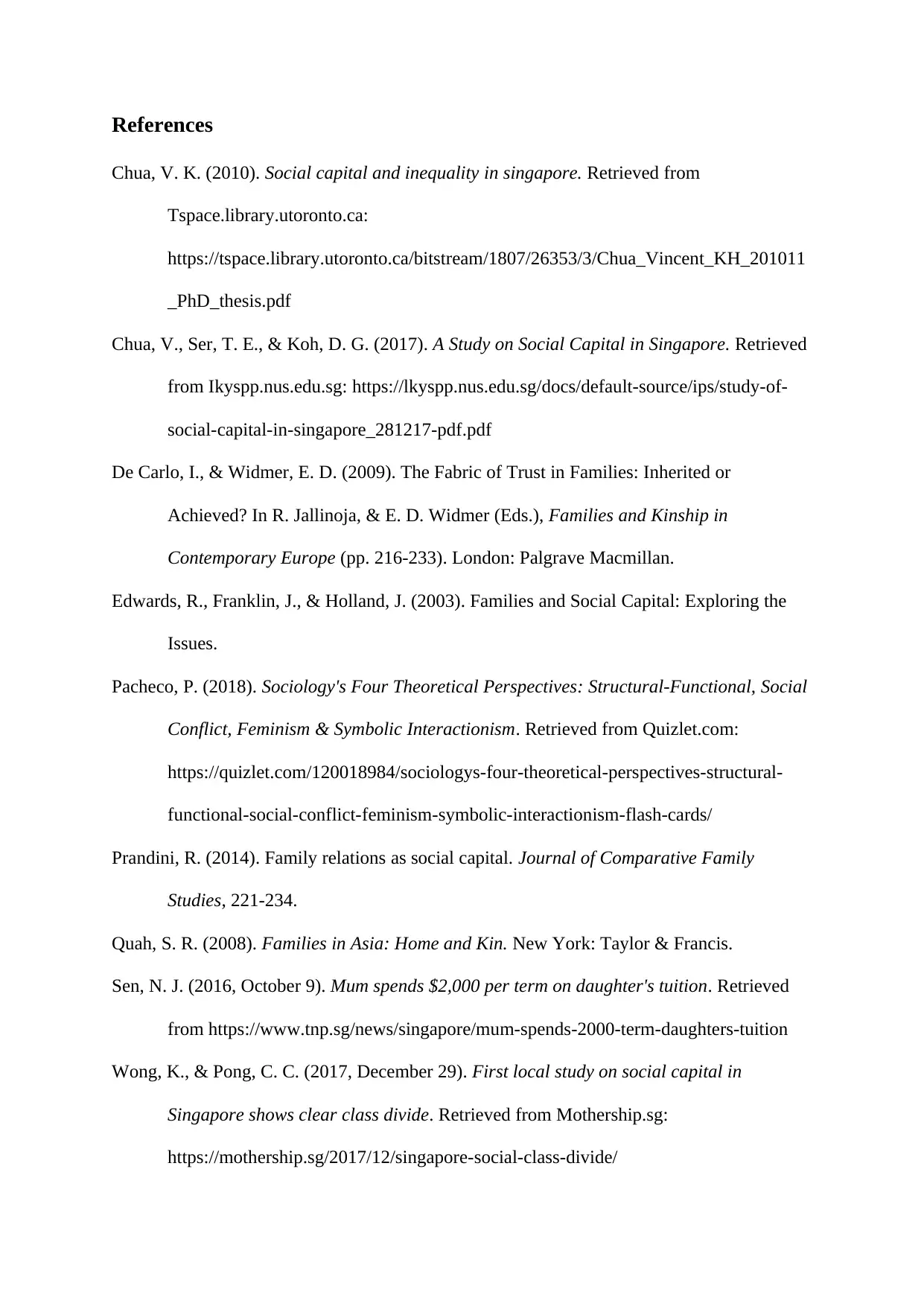
References
Chua, V. K. (2010). Social capital and inequality in singapore. Retrieved from
Tspace.library.utoronto.ca:
https://tspace.library.utoronto.ca/bitstream/1807/26353/3/Chua_Vincent_KH_201011
_PhD_thesis.pdf
Chua, V., Ser, T. E., & Koh, D. G. (2017). A Study on Social Capital in Singapore. Retrieved
from Ikyspp.nus.edu.sg: https://lkyspp.nus.edu.sg/docs/default-source/ips/study-of-
social-capital-in-singapore_281217-pdf.pdf
De Carlo, I., & Widmer, E. D. (2009). The Fabric of Trust in Families: Inherited or
Achieved? In R. Jallinoja, & E. D. Widmer (Eds.), Families and Kinship in
Contemporary Europe (pp. 216-233). London: Palgrave Macmillan.
Edwards, R., Franklin, J., & Holland, J. (2003). Families and Social Capital: Exploring the
Issues.
Pacheco, P. (2018). Sociology's Four Theoretical Perspectives: Structural-Functional, Social
Conflict, Feminism & Symbolic Interactionism. Retrieved from Quizlet.com:
https://quizlet.com/120018984/sociologys-four-theoretical-perspectives-structural-
functional-social-conflict-feminism-symbolic-interactionism-flash-cards/
Prandini, R. (2014). Family relations as social capital. Journal of Comparative Family
Studies, 221-234.
Quah, S. R. (2008). Families in Asia: Home and Kin. New York: Taylor & Francis.
Sen, N. J. (2016, October 9). Mum spends $2,000 per term on daughter's tuition. Retrieved
from https://www.tnp.sg/news/singapore/mum-spends-2000-term-daughters-tuition
Wong, K., & Pong, C. C. (2017, December 29). First local study on social capital in
Singapore shows clear class divide. Retrieved from Mothership.sg:
https://mothership.sg/2017/12/singapore-social-class-divide/
Chua, V. K. (2010). Social capital and inequality in singapore. Retrieved from
Tspace.library.utoronto.ca:
https://tspace.library.utoronto.ca/bitstream/1807/26353/3/Chua_Vincent_KH_201011
_PhD_thesis.pdf
Chua, V., Ser, T. E., & Koh, D. G. (2017). A Study on Social Capital in Singapore. Retrieved
from Ikyspp.nus.edu.sg: https://lkyspp.nus.edu.sg/docs/default-source/ips/study-of-
social-capital-in-singapore_281217-pdf.pdf
De Carlo, I., & Widmer, E. D. (2009). The Fabric of Trust in Families: Inherited or
Achieved? In R. Jallinoja, & E. D. Widmer (Eds.), Families and Kinship in
Contemporary Europe (pp. 216-233). London: Palgrave Macmillan.
Edwards, R., Franklin, J., & Holland, J. (2003). Families and Social Capital: Exploring the
Issues.
Pacheco, P. (2018). Sociology's Four Theoretical Perspectives: Structural-Functional, Social
Conflict, Feminism & Symbolic Interactionism. Retrieved from Quizlet.com:
https://quizlet.com/120018984/sociologys-four-theoretical-perspectives-structural-
functional-social-conflict-feminism-symbolic-interactionism-flash-cards/
Prandini, R. (2014). Family relations as social capital. Journal of Comparative Family
Studies, 221-234.
Quah, S. R. (2008). Families in Asia: Home and Kin. New York: Taylor & Francis.
Sen, N. J. (2016, October 9). Mum spends $2,000 per term on daughter's tuition. Retrieved
from https://www.tnp.sg/news/singapore/mum-spends-2000-term-daughters-tuition
Wong, K., & Pong, C. C. (2017, December 29). First local study on social capital in
Singapore shows clear class divide. Retrieved from Mothership.sg:
https://mothership.sg/2017/12/singapore-social-class-divide/
Paraphrase This Document
Need a fresh take? Get an instant paraphrase of this document with our AI Paraphraser
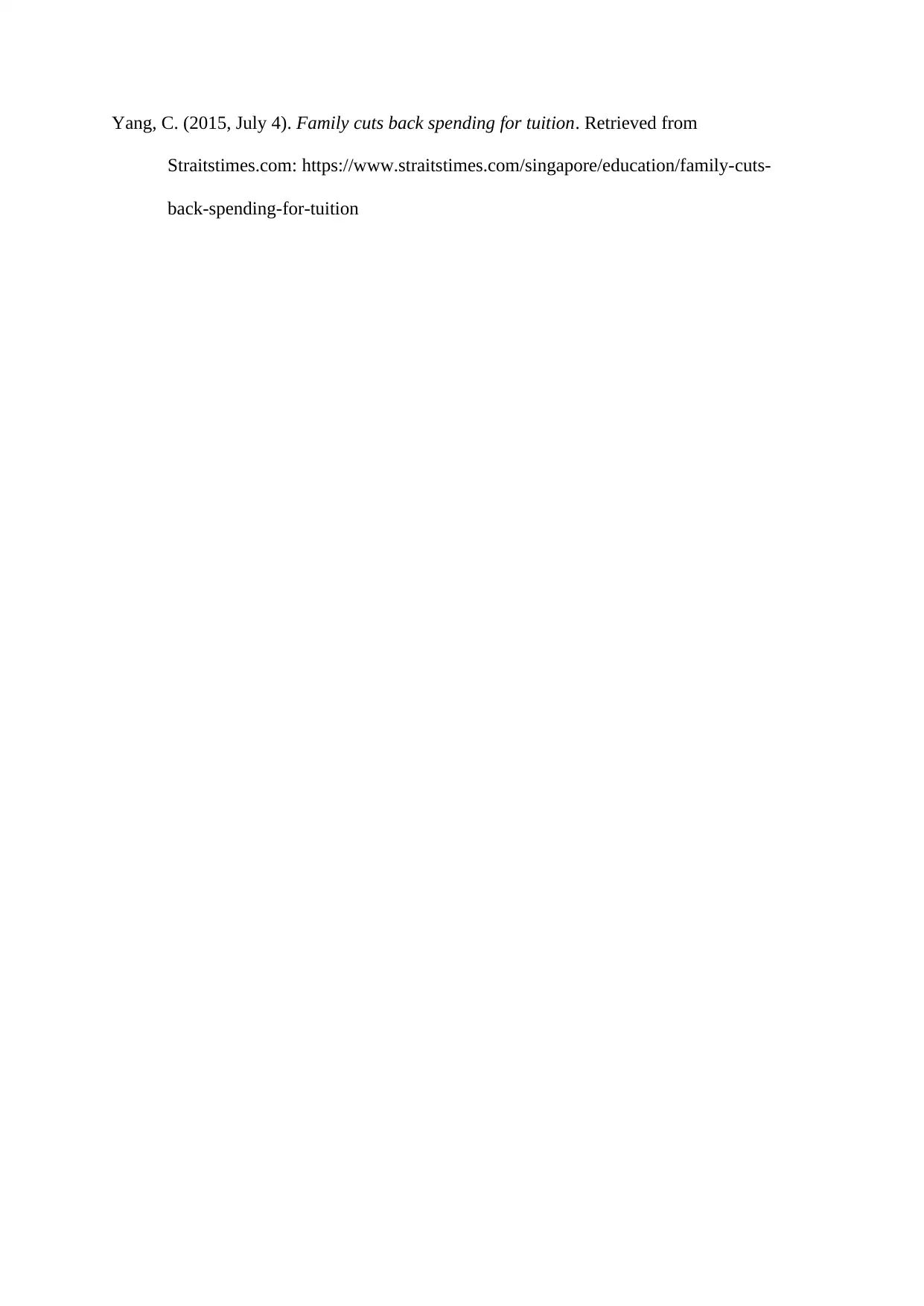
Yang, C. (2015, July 4). Family cuts back spending for tuition. Retrieved from
Straitstimes.com: https://www.straitstimes.com/singapore/education/family-cuts-
back-spending-for-tuition
Straitstimes.com: https://www.straitstimes.com/singapore/education/family-cuts-
back-spending-for-tuition
1 out of 8
Related Documents
Your All-in-One AI-Powered Toolkit for Academic Success.
+13062052269
info@desklib.com
Available 24*7 on WhatsApp / Email
![[object Object]](/_next/static/media/star-bottom.7253800d.svg)
Unlock your academic potential
Copyright © 2020–2025 A2Z Services. All Rights Reserved. Developed and managed by ZUCOL.





